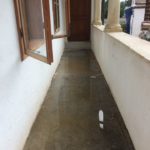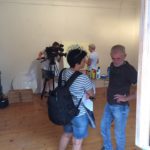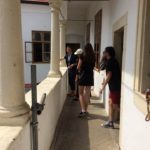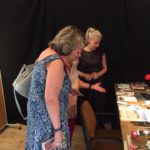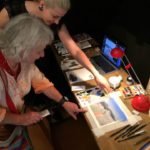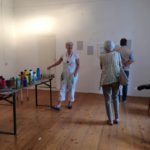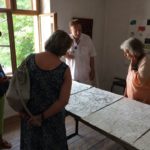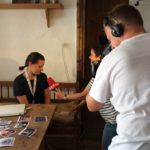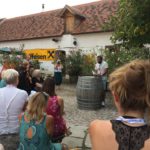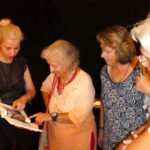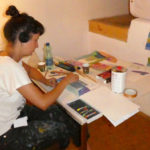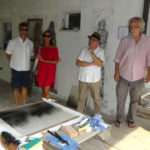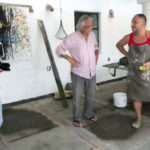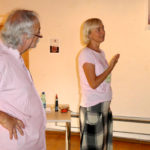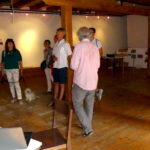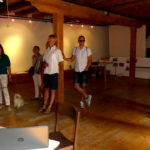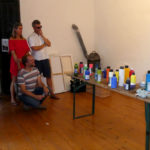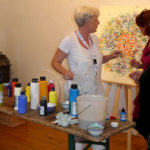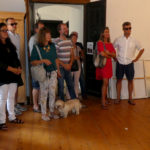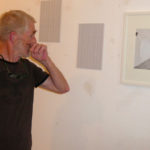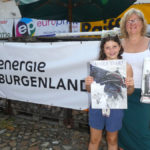The Tortoise
It was a bargain buy. »It’s in great physical shape,« the vendor said, proudly stroking his excessively puffy moustache. »Fit as a fiddle. I’ll give you a good deal, just because it‘s you. You seem like a nice guy.« Back then I didn‘t know any better and believed him.
So I paid him and was very pleased with my purchase. What a good price for a Greek tortoise, and, at least that‘s what I thought back then, quite a beautiful one at that. »It‘s 15 years old now,« the vendor had said to me. »With good care, it can live to a hundred.«
With my tortoise in a shoebox I headed home. That summer was a terribly hot and humid one, and I vividly remember thinking to myself, the tortoise must be delighted about the heat. »Just like home,« I had whispered to it on our bus ride back to my apartment, me on a plastic seat that was slowly becoming sticky under my sweating thighs, the tortoise in its shoebox on my lap. It hardly moved. Now and then I opened the lid, which was scattered with little holes I had pricked into it with a ballpoint pen, but the tortoise had hidden in its shell and was lying in a corner, perfectly still.
After a few days of getting used to each other in the peaceful calm and sweltering heat of my small city apartment, I named the tortoise Egon. I thought it was a fitting name.
Egon appeared to be very comfortable. He ate plenty. His favourites were lettuce, cucumbers, tomatoes, and strawberries, which he sometimes devoured so greedily, red strawberry juice would trickle from his narrow, hard nostrils. He did his business at regular intervals, and it looked just like it was supposed to look. To make sure, I had done a Google research myself and clicked my way through countless images of tortoise poop until I was satisfied that everything was as it should be when it came to my tortoise and his poop.
At first, Egon lived in a guinea pig cage I still had standing around in my cellar compartment from when it had belonged to my guinea pig Konstantin, who had passed away many years ago. But soon, I started to feel a little sorry for Egon, because there really wasn‘t a lot of space for him in a guinea pig‘s cage. So I decided to just let Egon roam free in my apartment. The cage‘s orange plastic floor part, from which I had cut out a piece so Egon could enter more easily, served as a place for him to retreat to, complete with sleeping nest and toilet. Egon was now moving completely freely about my apartment. The two of us, owner and pet, made quite the harmonious, happy team, I thought. Nothing about it felt unusual. I could never have guessed how wrong I was.
Because soon, the night that changed everything came. I was just about to fall asleep, entering this hypnotically pleasant stage when you haven‘t yet arrived at asleep but are far from awake all the same. A phase of sleep that paralyses your limbs and sends your thoughts reeling and traveling along convoluted paths. That was the beautiful state I was in, when suddenly I heard a noise. Knocking or scratching at my door, it was hard to tell in my trance. It stopped after a while, but soon after, it started up again. Then my door opened, and from my bed I could see Egon crawl along the narrow strip of light that the street lamp cast on my bedroom floor. With determined, rhythmically rowing movements, he pushed himself forward, closer and closer towards my bed. I was much too tired to move him from my room back to his sleeping nest, and anyway, he wasn‘t bothering me. It was just strange, as he hadn‘t ever spent time in my bedroom before or shown any interest in wanting to explore it. He probably wanted to be close to me, was the last thought I had before dozing off again.
When I woke up, I noticed something pressing against my legs. It was Egon, cheerfully crawling across my blanket. He was throwing his scaly little legs forward energetically, his claws repeatedly catching in the folds. »For God‘s sake, Egon,« I muttered into the black room. Head still thick with sleep, I didn‘t think to wonder how he had even made it onto my bed. I heard a soft coughing sound coming from Egon‘s direction and then, »Hello, Gustav.«
I sat up with a start. Automatically, I answered back with a »Hello«.
»Can‘t you sleep, either?« Egon asked.
Egon‘s voice was deep and loud, too loud for his small tortoise body. He sounded like an old wizard. I stared at my tortoise, who suddenly seemed alien to me. My tortoise stared back. We probably were a funny sight.
After a while, I answered him, »No, I don‘t have trouble sleeping though I‘m not so sure now. Why? Are you having a hard time falling asleep?« At that moment, I couldn‘t yet fully comprehend the absurdity of the situation. I was sitting on the bed in my dark bedroom, chatting with my Greek tortoise that I had purchased for a really good price at a flea market a few weeks ago. Egon gave a rattling sigh. »No, I haven‘t slept a wink tonight. Maybe it‘s because of the full moon.« We were silent for a while. »Egon,« I said at some point, »I didn‘t know you could talk.«
»Yes, I can,« he answered in that voice of his that was so deep and loud I was worried it would wake the neighbours. »Tortoises talk. And by the way, my name is Freda, not Egon.«
Now my confusion was complete. Egon was called Freda, had apparently received a name without any help on my part, and belonged to a species that was capable of talking but that, as far as I knew, had never chosen to. Questions piled up inside my head. I asked the stupidest one of them, »So you‘re a girl, Egon? Freda?«
»Yes, I am.«
»Your voice,« I said, »it sounds so masculine.«
»How would you know whether a tortoise‘s voice sounds masculine or feminine? Have you suddenly become an expert on tortoises? Just two weeks ago, I saw you lying on the living room floor in your underpants, looking at tortoise shit on your iPad.«
At that moment I was glad the black night air filling my bedroom managed to conceal my reddening cheeks. I was embarrassed in front of my tortoise. Which made me feel even more embarrassed.
»Well, is a male lion‘s roar deeper than a female‘s?«
»I don‘t know?«
»No, it isn‘t. Does a stallion‘s neighing sound deeper than a mare‘s?«
»Maybe a little?«
»You don‘t know what you‘re talking about.«
»Maybe you‘re right. But maybe you‘ll also understand that I‘m a little confused right now. Have you always been able to talk?«
»Yes, I have. I didn‘t just learn it from you. Don‘t take yourself so seriously.«
»No, I don‘t. Really,« I tried to placate my tortoise, who appeared to be getting upset. »It‘s just, you never said anything before now, so…«
»I simply had nothing to say.«
»Okay.«
»Okay.«
»Okay.«
»Okay, I‘ll be on my way, then.«
After that night, Egon – I couldn‘t bring myself to call him »Freda« – didn‘t say anything for a long time. Soon I had forgotten that he had even spoken to me that night. Still, a strange distance grew between me and my tortoise. I didn‘t really trust him anymore.
I remember a moment when I was sitting on my couch in the living room.
Outside, autumn was already in full swing. On my way home from work, I had devoured a kebab at Yasin‘s, my favourite kebab shop, and the extra onions were giving me indigestion. Pressure was starting to build up behind my waistband. I was about to let off a possibly really loud, really long fart. But then I saw Egon crawling across the carpet, looking up at me. I went to the bathroom and relieved myself there.
A few days after this incident, I suddenly found Egon sitting on my bed again. I startled awake from deep sleep and saw my tortoise sitting on my pillow right in front of me.
»Egon?« I asked.
»I already told you, my name is Freda.«
»Freda. What are you doing here again?«
»I wanted to ask you something.«
»And what?«
»Did you turn off the stove?«
»Excuse me?« I asked, half-confused, half-angry.
»I wanted to know if the stove is off. It might still be running, you know.«
»Yes, it‘s off.« I was flabbergasted.
»Are you sure? Because I thought I watched you take the noodles off the stove without turning it off and then go to the living room. I might be wrong though.«
»Yes, you‘re wrong. Now please, let me go back to sleep.«
»All right. If you say so, I guess you‘re right. I‘m just asking. Surely you remember that one time at the vacation house in Spain.«
I startled upright again. »Wait a minute! How do you know about the incident at the vacation house in Spain?«
»I know a lot of things, Gustav.« For a few moments, my tortoise regarded me with a keen gaze. Then he started moving his sharp lips again, a pink tongue peeking out from behind them. »I also know what happened after that vacation in Spain.«
What on earth was going on? How did Egon know about all that? After that time in the vacation house in Spain, where the little kitchen‘s stove exhaust fan had caught fire and I had been the one to blame, unpleasant things had happened. I had no clue why Egon had brought up this incident now, in the middle of the night. I tried to avoid Egon‘s needling by ignoring it skilfully, didn‘t say much and waited for Egon to leave my room, which he did at some point.
„You‘re getting old,« I heard Freda say one night from across the other end of my bed. I had gotten used to the name »Freda« by now. Again, I had been about to fall asleep when I heard her voice. I rolled my eyes behind closed eyelids.
»Yes, Freda, thanks, I know. That‘s kind of what humans do, and animals, too, by the way. As far as I know, nobody gets younger.«
»Yeah, yeah, I know that you know. I‘m just saying.«
»Just saying what exactly?« I asked rhetorically, annoyed. »Please enlighten me.«
»Well,« Freda began, »I‘m saying you‘re 37 now.«
»And?«
»Do you really think it‘s wise to focus on your career in painting right now? I get that you didn‘t enjoy your work at the agency any more, I really do, don‘t get me wrong. But still, it was a secure source of income, and simply giving up something like this was a bit, well, I don‘t want to offend you, but it was a bit stupid.«
I didn‘t move, kept my eyes closed and clenched my fists into the fabric of my blanket, trying to ignore my tortoise.
»You have a young daughter to feed, after all. Even if you don‘t see her that often. Because she‘s staying with her mother.« My tortoise‘s loud, deep voice took on a slightly accusatory tone.
»Please leave my daughter out of this. She‘s so none of your business. Just like my career choices are none of your business. Okay. I wasn‘t happy at the agency anymore, and that‘s an important factor to consider. I‘d rather be in debt and a happy father to my daughter than an unhappy one with loads of money in my account. Money isn‘t everything, my dear Freda. Most of all, money doesn‘t equal happiness.«
»With all due respect, Gustav, I don‘t think you‘re unintelligent, and this money-cannot-buy-happiness-thing is cute and commendable and all, but you should be too old for this teenager-hippie-idealism. It‘s not just about you anymore, it‘s about your daughter. How will you ever be able to pay for her university? What if she wanted to study abroad? Or get her driver‘s licence? For all I care, you could live so modestly Diogenes would envy you, but you have responsibilities.«
»There‘s still her mother, it‘s not like that.« I tried to steer the discussion in another direction.
»Yeah, yeah, yeah,« Freda said mockingly, »don‘t go shifting the responsibility onto your ex now. It‘s always someone else‘s fault, isn‘t it? That‘s what you‘re good at, Gustav, aren‘t you? It‘s cowardly and really awful. What happens, for example, if something happens to your ex? If she gets ill? Something could happen any day. Are you prepared for these eventualities?«
»Freda, that‘s really far-fetched now. Please just shut up and let me sleep.«
From that moment on, that‘s how it went almost every night. At some point during the night, Freda would shove herself into my room, mostly at a time when I was just about to fall asleep, and then somehow sit on my bed.
Every time she found a different important topic that she wanted to talk about with me. One time she reminded me that my bank balance was negative right now. Another time, she warned me about my current romance, and another, she brought up the odd rash I‘d had on my forearm for a few weeks.
At some point later, she began to talk about my parents, my brother, my cousin, my weird great-aunt. Freda never ran out of new ideas about how these people could bring disaster into my life. She would talk at me incessantly until I almost lost my mind, and then she would leave again.
At the start, I didn‘t mind so much, because she would come to me at irregular intervals. After a while, however, her night-time visits started to occur more often. Until at some point, it became every night, and the missing hours of sleep began to impact my everyday life. They left me unable to concentrate and constantly drowsy. It wasn‘t pretty. The circles under my eyes grew bigger and darker, my stomach thicker, my hair sparser.
I trudged through my days in a blur, feeling completely out of it. It was a strange time.
One day, while I was crossing a busy street in my city, I saw him again. The man with the excessively puffy moustache, who had tricked me into buying Freda for a bargain price. We looked at each other amidst the hustle and bustle of busy street crossers. We exchanged a short glance, one that said more than most glances, like one between two people who accidentally wind up sitting across from each other on the tramway after a visit to the brothel or an Alcoholics Anonymous meeting – ashamed, knowing, connected. Quickly, we averted our eyes from each other and went our ways.
At some point, I was so exhausted I made a decision. I grabbed Freda, put her in the shoebox, and marched towards the flea market where I had got her back then.
In front of me stood a young student with dark hair that she wore in a thick braid. »It‘s about 16 years old now,« I heard myself say, »With good care, it can live to a hundred.« The student nodded with interest. A bargain offer and a handshake later, I watched the student and her blue shoebox disappear among the crowd. My guilty conscience haunted me for long time.
Biographical to Johanna Sebauer [AT] »
Born in 1988 in Vienna and raised in Burgenland, Austria. She first studied Political Science at the University of Vienna and then pursued a Masters in Journalism, Media and Globalization in Aarhus (DK), Santiago de Chile and Hamburg. A few years ago she stared writing fiction. In 2014 her short story »Edina« was awarded the Burgenland Literature Prize, in 2016 her radio play »Wie Erna Rohdiebl aus Pamhagen ihr Herz an die Nordsee verlor« made the short list of the radio play competition »Textfunken« of Austria’s public broadcaster ORF. Currently she lives as a freelance author and editor in Hamburg.
www.johannasebauer.com
back to Teilnehmer/innen 2017 »




